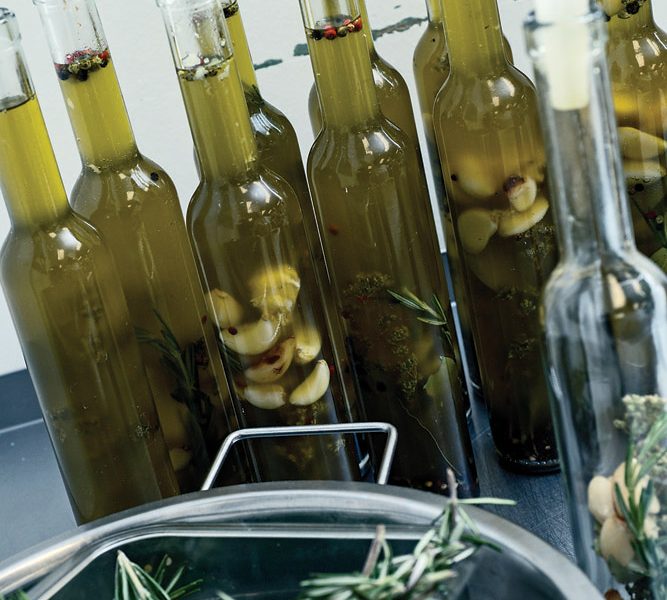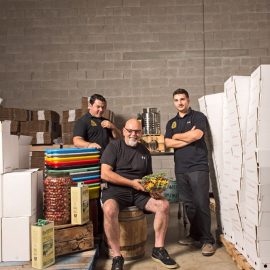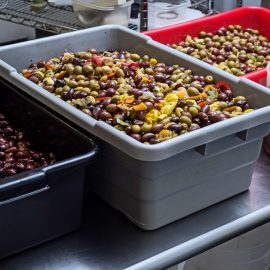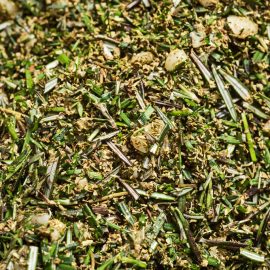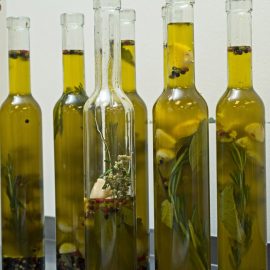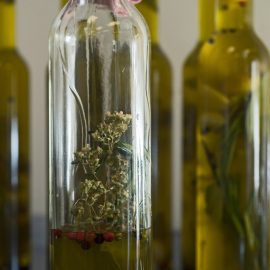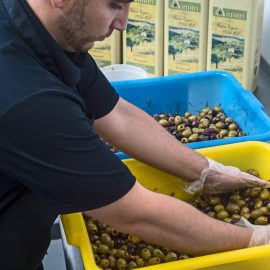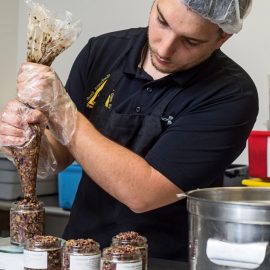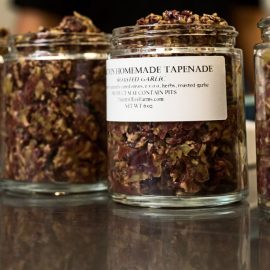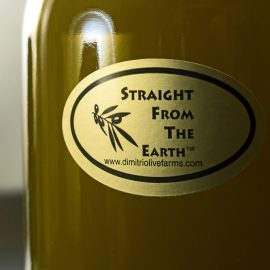Food & Drink
Pit Stop
A local olive vendor wants customers to see where his product comes from—back on his farm in Greece.
I was standing under the JFX viaduct at the Baltimore Farmers’ Market & Bazaar one drizzly autumn day last year, the air heavy with the scent of frying onions, coffee, and wet tar, when a sign reading, “Come pick olives at our farm in Southern Greece,” beckoned. Immediately, my gaze wandered to a display of heavy glass bottles, glistening with golden liquid. I’d seen these bottles before—Dimitri’s Olive Oil is served exclusively in several top-ranked Baltimore, Philadelphia, and Washington, D.C., restaurants, including Gertrude’s, The Prime Rib, and The Food Market. Though the oil is produced from olives grown in Greece, farmers’ market officials consider it a sustainable food product, because Dimitri’s olive-oil infusions and spreads are created and bottled by hand in Baltimore. And because olives don’t grow in the Mid-Atlantic, there’s no conflict with local growers.
An energetic advocate of having us connect with the food we consume, Dimitrios Giannakos, known affectionately as “Dimitri” by those in the culinary and Greek communities, is eager to bring Baltimoreans back to his olive farm in southern Greece. Guests stay with him or rent rooms, help pick and press olives, dine in the town’s only tavern, and take cooking lessons with village women. Each excursion is unique, personalized to the particular interests of the visitor.
At his simple stand at the Baltimore farmers’ market, Dimitri, a warm and gentle man, who carries himself with a deep sense of pride, keeps a plastic-coated photo album of his farm. On that rainy morning, as I thumbed through the photographs, the gray day gave way to images of green olive groves against the backdrop of the Aegean Sea; I decided then and there that I needed to go.
Several months later, Dimitri meets me and my travel companion, Elizabeth Comer, a Baltimore-based archaeologist, at the Athens airport, and we begin the three-hour journey to his more than 100-year-old farm. Tarapsa (known as Vassilaki to locals)—a tiny village in southern Greece’s olive-growing region—is 12 miles outside of Sparta, in the agrarian region of Laconia. Laconia, and its neighbor Messenia, share Greece’s southernmost peninsula, and are the country’s principal olive-growing regions. Two mountain ranges, Taygetos and Parnon, protect Laconia’s rocky landscape, ensuring an arid climate, ideal for olive production. “The southern part [of Greece] got left behind,” explains Dimitri. “We don’t have [a major] airport and the people here didn’t want a lot of tourists.”
Ever since immigrating to America in 1967 and joining his relatives in Baltimore the following year, Dimitri’s homeland has never been far from his mind. Ironically, when the Giannakos family arrived at Penn Station in April, 1968, the city was under lockdown due to riots sparked by the assassination of Dr. Martin Luther King Jr. As the family waited in vain for relatives scheduled to pick them up, they could see a city engulfed in smoke and hear police sirens. “I looked up at my mother and said, ‘Mama, this is America?’ I wanted to go back to my little village in Greece.”
Dimitri’s olive oil is served exclusively in several top-ranked Baltimore restaurants.
For Dimitri, the trips have always been a nostalgic homecoming of sorts, and through the years, more than 30 couples and families have joined him on these excursions. “I wanted people to see the beauty that exists in southern Greece,” says Dimitri. “I never made money from it—it wasn’t about that. [My guests] stayed on the farm and helped me pick olives, and I’m still in touch with most of them; many have come back.”
Dimitri’s village spans about two miles up a mountain. The farmhouse is midway up, overlooking Dimitri’s 65 acres of olive groves. The Arcadian three-bedroom farmhouse, in which Dimitri was born and raised, is still heated by a fireplace. Back then, houses in the village had no electricity or running water, but Dimitri has since added modern amenities. “You can drink the water,” he says, handing us a glass.
Here, olive oil all but runs through the villagers’ veins. Each family maintains a grove and works together during the harvest, as have local families for generations. Villagers’ homes contain tanks resembling large hot-water heaters filled with their annual olive-oil harvest, to tap on demand. Surely, what perpetuates this ancient family ritual is the fact that the families can live off their land, which makes them somewhat immune to the recession that has been crippling Greece.
For dinner on our first night, we head to the village tavern, which always has freshly bakedbread and olive oil on hand. Hungrily, we dunk our bread into the oil. The herbaceous aroma overwhelms our senses. “Good olive oil should taste a little bitter, peppery,” says Dimitri. “When you get that nice, healthy burn in your throat, you know you’re eating oil produced from healthy olives.”
Days later, Dimitri leads us into the grove of trees brimming with ripe olives. Finally, it’s time for us to get to work. My upper body shakes as I comb the tree with the juddering kupepe, a giant weed whacker-like device that triggers a pelting rainstorm of hard, sun-ripened black Koroneiki olives on my head. The tarp beneath my feet, collecting the falling fruit, is the only thing saving me from sinking into the mud. Abni, the farmhand, takes over and finishes the entire tree in a quarter of the time it takes me to comb olives off of two branches.
My travel companion and I hurry to roll the edges of the tarp inward, pooling the olives in the center. Next, we hold open burlap sacks for Abni to fill with the olives. Seemingly without any effort, Abni swings the massive sack over his shoulder and dumps it onto the pile he has already collected. Moving the tarps to the next tree, we begin again. The work is strenuous, but exhilarating.
While gathering olives, we learn about harvesting: “The olive oil is very angry when it’s freshly produced,” says Dimitri. “That olive goes through torture—it gets picked, bagged, blown, washed, pressed; it needs to settle down and let out all its aromas and nice flavors.” The oil then gets separated, its dark, excess liquid discarded into wells, later to be used as fertilizer. The clearest, lightest, most flavorful liquid is collected into barrels.
Dimitri’s oil is packaged in cans and bottles, and packed for shipping on a pallet, which holds about 60 cases of cans and bottles. Ten to 20 pallets are packed into a container, sealed, certified, and transported to the Port of Piraeus, the very spot from which Dimitri and his family set off for America. From there, the pallets are loaded onto a cargo ship headed for the Port of Baltimore. In all, the voyage takes about 30 days.
“It’s so clean and unfiltered––making fresh food taste even fresher. It’s liquid gold.”
Three months later, a world away from Tarapsa, I meet Dimitri and his family in his Baltimore County commercial kitchen, where he infuses and packages the oil. Although all of the kids were born in Greece, they chatter in English. Dimitri’s 26-year-old stepson, “Little Dimitri,” has created the company’s new website. He busies himself making garlic-infused tapenades, and feta cheese and pepper spreads with olives and cheese from Southern Greece. Dimitri’s sister, Paula, infuses bottles of oil with fresh herbs such as rosemary. His son, Omiros, who works the farmers’ markets in Northern Virginia, labels everything. His wife, Naya, who isn’t at the kitchen on this day, works Saturdays at the Bel Air Farmers’ Market. In November, the kitchen will be moving to a new location on Biddle Street in Baltimore, where Dimitri and the family will operate a Greek deli and market featuring their products and local produce.
Selling his product in Baltimore has not always been easy. Dimitri initially met resistance when he approached the 32nd Street Farmers’ Market in Waverly. The organizers were concerned about rankling their vendors, since he wasn’t a local producer. “I said ‘Look, nobody [locally] can produce olive oil and nobody can make olives, so I’m not competing against anybody. Let me do a free tasting.’ So we went there, set up a table with olive oil and tasting cups, and people went nuts,” he says. “The board voted and let me in.”
Thanks to the exposure at the farmers’ markets, Dimitri’s olive oil made its way onto the local restaurant scene. “Years ago, we were having dinner at The Prime Rib and we asked for olive oil,” recalls Dimitri, “and they gave us some that didn’t taste right. I said ‘Let me give you something where you can taste the difference’—and that’s how we got started.”
Gertrude’s owner John Shields and Chad Gauss, owner of The Food Market, discovered Dimitri’s at the Waverly farmers’ market. “It was one of the best olive oils I’ve ever had,” Shields says, “so much flavor and depth, the color—everything about it. It’s so clean and unfiltered—making fresh food taste even fresher. It’s liquid gold.”
Many months after my trip, Dimitri presides over his stand at Waverly. He’s like a proud papa as he assists two customers, who leave with two bottles each. “When people ask me a question, I respond with my soul because I want them to know the difference,” he says after his customers leave. “In the early days, sometimes people wouldn’t have enough money on them. My thing was like, ‘If you like it, take it, and pay me next week.’ I never lost a penny by giving people olive oil and telling them to pay me next time.”
If you are interested in visiting Dimitri Giannakos’s olive-oil farm, contact him at dimitriolivefarms.com.
